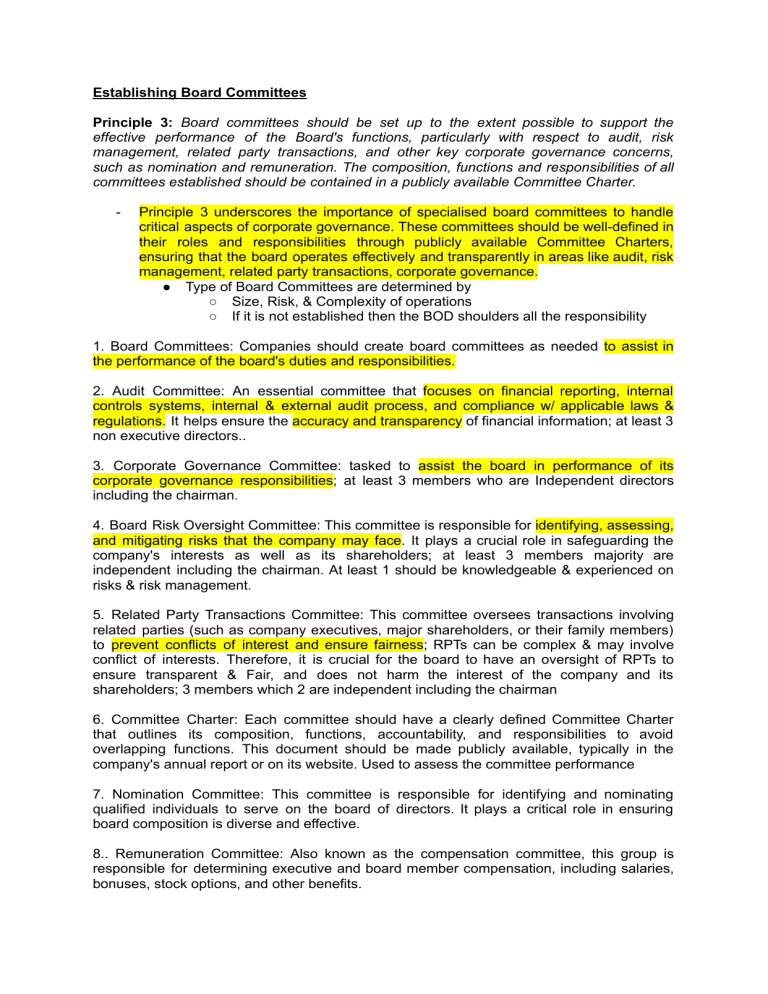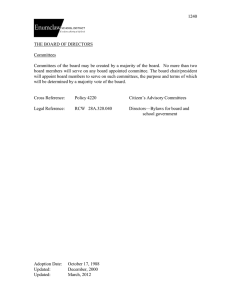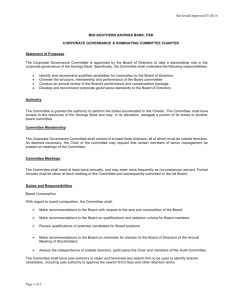
Establishing Board Committees Principle 3: Board committees should be set up to the extent possible to support the effective performance of the Board's functions, particularly with respect to audit, risk management, related party transactions, and other key corporate governance concerns, such as nomination and remuneration. The composition, functions and responsibilities of all committees established should be contained in a publicly available Committee Charter. - Principle 3 underscores the importance of specialised board committees to handle critical aspects of corporate governance. These committees should be well-defined in their roles and responsibilities through publicly available Committee Charters, ensuring that the board operates effectively and transparently in areas like audit, risk management, related party transactions, corporate governance. ● Type of Board Committees are determined by ○ Size, Risk, & Complexity of operations ○ If it is not established then the BOD shoulders all the responsibility 1. Board Committees: Companies should create board committees as needed to assist in the performance of the board's duties and responsibilities. 2. Audit Committee: An essential committee that focuses on financial reporting, internal controls systems, internal & external audit process, and compliance w/ applicable laws & regulations. It helps ensure the accuracy and transparency of financial information; at least 3 non executive directors.. 3. Corporate Governance Committee: tasked to assist the board in performance of its corporate governance responsibilities; at least 3 members who are Independent directors including the chairman. 4. Board Risk Oversight Committee: This committee is responsible for identifying, assessing, and mitigating risks that the company may face. It plays a crucial role in safeguarding the company's interests as well as its shareholders; at least 3 members majority are independent including the chairman. At least 1 should be knowledgeable & experienced on risks & risk management. 5. Related Party Transactions Committee: This committee oversees transactions involving related parties (such as company executives, major shareholders, or their family members) to prevent conflicts of interest and ensure fairness; RPTs can be complex & may involve conflict of interests. Therefore, it is crucial for the board to have an oversight of RPTs to ensure transparent & Fair, and does not harm the interest of the company and its shareholders; 3 members which 2 are independent including the chairman 6. Committee Charter: Each committee should have a clearly defined Committee Charter that outlines its composition, functions, accountability, and responsibilities to avoid overlapping functions. This document should be made publicly available, typically in the company's annual report or on its website. Used to assess the committee performance 7. Nomination Committee: This committee is responsible for identifying and nominating qualified individuals to serve on the board of directors. It plays a critical role in ensuring board composition is diverse and effective. 8.. Remuneration Committee: Also known as the compensation committee, this group is responsible for determining executive and board member compensation, including salaries, bonuses, stock options, and other benefits. 9. Transparency: By making the Committee Charter publicly available, the company enhances transparency and accountability to its shareholders and stakeholders. This transparency helps build trust in the company's governance practices. Fostering Commitment Principle 4: To show full commitment to the company, the directors should devote the time and attention necessary to properly and effectively perform their duties and responsibilities, including sufficient time to be familiar with the corporation's business. - Principle 4 underscores the need for directors to be fully committed to the company, devote the necessary time and attention to their roles, and stay well-informed about the company's business and governance responsibilities. This commitment is essential for effective corporate governance and for ensuring that directors act in the best interests of the company and its stakeholders. 1. Director Commitment: Directors should demonstrate full commitment to the company they serve. This commitment signifies their dedication to acting in the best interests of the company and its stakeholders. Must attend & actively participate in all meetings of the BOARD, COMMITTEES, & SHAREHOLDERS, unless when justifiable. Absence for more than 50% of all reg & special meetings is ground for disqualification in the succeeding election, unless justifiable (fortuitous events). Non-executive directors can serve a max of 5 publicly listed companies, and should notify the board if he is currently holding a position as director in another company, to ensure that the members of the board are able to effectively commit themselves to perform their roles & responsibilities, regularly update their knowledge & enhance their skills. Reinforcing Board Independence Principle 5: The board should endeavour to exercise an objective and independent judgement on all corporate affairs. The presence of an independent director in the board is to ensure the exercise of independent judgement on corporate affairs & proper oversight of managerial performance including prevention of conflict of interest and balancing of competing demands of the corp (fiduciary duty & priorities). ● Not related to any covered company (competition), does not have more than 2% of the outstanding shares of the covered company. This is to further ensure independence by preventing them from having financial interest in the company that could influence their decision. ● Serve cumulative of 9 yrs after that, barred from re-election as such, and can now qualify as non independent director. ● CEO & Chairman should be held by separate individuals. This is because when the same person holds both positions, it can be difficult for them to act impartially (equally). The Ceo may be tempted to influence the boards decision in their own favour, & the board may be reluctant to challenge the ceo's decision. But, if it is held by same person A LEAD DIRECTOR IS DESIGNATED to avoid abuse of power & authority, and potential conflict of interest. ● NED should have separate periodic meetings w/ the external auditor & heads of internal audit, compliance & risk functions w/o any executive directors, to ensure that proper checks & balances are in place.






